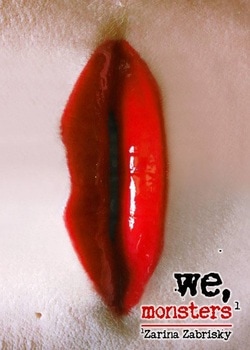We, Monsters by Zarina Zabrisky

Paperback: 316 pages
Publisher: Numina Press, 2013 (Vox Nova)
Available for purchase at: Numina Press
Review by April Michelle Bratten
When I was a young girl playing in a concrete neighborhood of Charleston, South Carolina, my best friend’s name was Zarina. We played in the southern heat all day until the street lights shone. We would then hug each other and run home, knowing that the next day we would do the same. I remembered this time in my life as I read We, Monsters, authored by a different Zarina. Zarina Zabrisky. Zabrisky’s talent, illustrated exceedingly well in this novel, is to form an intimate and intense connection with her readers, a connection so strong, that it feels like a secret being revealed, shared between two old friends.
I have read a handful of other reviews of We, Monsters, intellectual reviews, smart reviews, reviews that delve into the psychological disturbances and beauties of the human mind. My own personal reviewing style is quite different. I review more from the heart than the brain, and as I read this book, my heart was squealing, This is fucking fantastic!
Don’t get me wrong, this book was indeed ripe with intellectual stimulation, uniquely crafted with footnotes to keep the reader informed of the symptoms of Dissociative Personality Disorder and Post Traumatic Stress Disorder. The extra information also underlined the root causes of dozens of sexual fetishes. These footnotes aided the reader into a deeper understanding of We, Monsters’ fascinating and broken characters, particularly the protagonist, Rose. They gave possibilities to why and how these characters did the things they did, said the things they said, and believed in what they believed in. The footnotes were windows into the character’s brains, and for anyone who has ever found psychology the least bit interesting, these tidbits are exciting brain candy. However, this added information would be lost, useless, and unimportant, if it wasn’t for the raw intimacy Zabrisky pumped into this novel with streams of devastatingly gorgeous prose.
Zabrisky takes the reader deep inside the distorted mind of Rose, a beautiful Russian immigrant turned soccer mom, who one day decides to become a dominatrix. Her past, her pain, and her traumas are illuminated slowly, like puzzle pieces softly connecting over the course of the novel. Zabrisky effortlessly ensures that we, the readers, are on Rose’s side from the beginning, and that the devotion we feel for the character only intensifies as time goes on, as Rose’s world begins to collapse around her, as the walls she has so carefully built start to rot and disappear:
I longed to tell him about the part of the Nightmare that I ever even thought about. Those cherries, those heavy and torn pieces of sweet meat, falling, falling, crashing on the blue asphalt. The bloody drops, the rotten smell, the buzzing flies, the churning of my intestines. And then, the emptiness. Then, all of a sudden I would discover myself all alone on the deserted beach. Standing on the cold rocks, frozen, chained and gagged. I looked up, and I couldn’t move. I screamed so hard the blood rushed from my throat, but nobody could hear me. Like a fish. I didn’t have a voice, I was invisible, I didn’t exist. That was the worst part about the Nightmare.
Rose is one of the most intricate characters I have read in quite some time, but Zabrisky knows her, her children, her husband, the other dominatrices, and the clients Rose interacts with so well, that I didn’t even realize how intimate I was becoming with her character until I had finished reading the story. It was a great feeling, a refreshing feeling, to know that such great characters are still being written and handled this expertly by contemporary authors.
Lastly, I wanted to mention the use of symbolism in the novel. Zabrisky masterfully uses a multitude of symbols throughout We, Monsters, most of which are innocently introduced toward the beginning of the novel. The symbols reappear throughout, gathering meaning and life as the story continues. Cherries, ants, amethyst light, Chinese women carrying umbrellas, eyelashes, steps, lemmings, smells, monsters. These images culminate at the end, surprising and stunning the reader with their power.
I must admit, We, Monsters was not what I was expecting to read when I initially picked it up. It startled me in a wonderful way. It was exciting, fun, tragic, beautiful, and revealing. I learned not only a good deal about my own desires, my own mentality, but a few pieces clicked into place for other people I have known in my life as well. Engrossing and intelligent, Zarina Zabrisky’s We, Monsters is an extraordinary read. Make sure you pick up a copy. You will be happy you did.
Publisher: Numina Press, 2013 (Vox Nova)
Available for purchase at: Numina Press
Review by April Michelle Bratten
When I was a young girl playing in a concrete neighborhood of Charleston, South Carolina, my best friend’s name was Zarina. We played in the southern heat all day until the street lights shone. We would then hug each other and run home, knowing that the next day we would do the same. I remembered this time in my life as I read We, Monsters, authored by a different Zarina. Zarina Zabrisky. Zabrisky’s talent, illustrated exceedingly well in this novel, is to form an intimate and intense connection with her readers, a connection so strong, that it feels like a secret being revealed, shared between two old friends.
I have read a handful of other reviews of We, Monsters, intellectual reviews, smart reviews, reviews that delve into the psychological disturbances and beauties of the human mind. My own personal reviewing style is quite different. I review more from the heart than the brain, and as I read this book, my heart was squealing, This is fucking fantastic!
Don’t get me wrong, this book was indeed ripe with intellectual stimulation, uniquely crafted with footnotes to keep the reader informed of the symptoms of Dissociative Personality Disorder and Post Traumatic Stress Disorder. The extra information also underlined the root causes of dozens of sexual fetishes. These footnotes aided the reader into a deeper understanding of We, Monsters’ fascinating and broken characters, particularly the protagonist, Rose. They gave possibilities to why and how these characters did the things they did, said the things they said, and believed in what they believed in. The footnotes were windows into the character’s brains, and for anyone who has ever found psychology the least bit interesting, these tidbits are exciting brain candy. However, this added information would be lost, useless, and unimportant, if it wasn’t for the raw intimacy Zabrisky pumped into this novel with streams of devastatingly gorgeous prose.
Zabrisky takes the reader deep inside the distorted mind of Rose, a beautiful Russian immigrant turned soccer mom, who one day decides to become a dominatrix. Her past, her pain, and her traumas are illuminated slowly, like puzzle pieces softly connecting over the course of the novel. Zabrisky effortlessly ensures that we, the readers, are on Rose’s side from the beginning, and that the devotion we feel for the character only intensifies as time goes on, as Rose’s world begins to collapse around her, as the walls she has so carefully built start to rot and disappear:
I longed to tell him about the part of the Nightmare that I ever even thought about. Those cherries, those heavy and torn pieces of sweet meat, falling, falling, crashing on the blue asphalt. The bloody drops, the rotten smell, the buzzing flies, the churning of my intestines. And then, the emptiness. Then, all of a sudden I would discover myself all alone on the deserted beach. Standing on the cold rocks, frozen, chained and gagged. I looked up, and I couldn’t move. I screamed so hard the blood rushed from my throat, but nobody could hear me. Like a fish. I didn’t have a voice, I was invisible, I didn’t exist. That was the worst part about the Nightmare.
Rose is one of the most intricate characters I have read in quite some time, but Zabrisky knows her, her children, her husband, the other dominatrices, and the clients Rose interacts with so well, that I didn’t even realize how intimate I was becoming with her character until I had finished reading the story. It was a great feeling, a refreshing feeling, to know that such great characters are still being written and handled this expertly by contemporary authors.
Lastly, I wanted to mention the use of symbolism in the novel. Zabrisky masterfully uses a multitude of symbols throughout We, Monsters, most of which are innocently introduced toward the beginning of the novel. The symbols reappear throughout, gathering meaning and life as the story continues. Cherries, ants, amethyst light, Chinese women carrying umbrellas, eyelashes, steps, lemmings, smells, monsters. These images culminate at the end, surprising and stunning the reader with their power.
I must admit, We, Monsters was not what I was expecting to read when I initially picked it up. It startled me in a wonderful way. It was exciting, fun, tragic, beautiful, and revealing. I learned not only a good deal about my own desires, my own mentality, but a few pieces clicked into place for other people I have known in my life as well. Engrossing and intelligent, Zarina Zabrisky’s We, Monsters is an extraordinary read. Make sure you pick up a copy. You will be happy you did.
|
Zarina Zabrisky is the author of two short story collections IRON and A CUTE TOMBSTONE (Epic Rites Press), and a novel WE, MONSTERS (Numina Press). Zabrisky moved to San Francisco from Moscow to escape the aftermath of a collapsing communist empire. She wrote traveling around the world as a street artist, oilfield translator, and a kickboxing instructor, and started to publish her work in 2011. Since then, Zabrisky's work appeared in over thirty literary magazines and anthologies in the US, UK, Canada, Ireland, Hong Kong and Nepal. She is a three-time Pushcart Prize nominee and a recipient of 2013 Acker Award for Achievement in The Avant Garde. |

